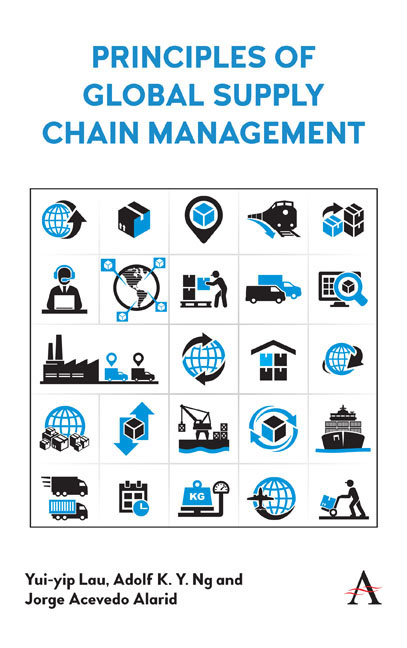Book contents
- Frontmatter
- Contents
- List of Figures
- List of Tables
- Foreword
- Preface
- About the Authors
- 1 Introduction
- 2 Managing Outbound Logistics and Distribution
- 3 Supplier Selection and Procurement
- 4 Warehouse Management
- 5 Case Studies in Food Supply Chains
- 6 Inland Ports in Global Supply Chains
- 7 Climate Change in a Global Environment
- 8 Sustainability in Infrastructure-Based Supply Chains
- 9 Reverse Logistics
- 10 Logistics Associations
- 11 Logistics Education
- 12 Case Exercises in Global Supply Chains
- Appendix
- Index
3 - Supplier Selection and Procurement
- Frontmatter
- Contents
- List of Figures
- List of Tables
- Foreword
- Preface
- About the Authors
- 1 Introduction
- 2 Managing Outbound Logistics and Distribution
- 3 Supplier Selection and Procurement
- 4 Warehouse Management
- 5 Case Studies in Food Supply Chains
- 6 Inland Ports in Global Supply Chains
- 7 Climate Change in a Global Environment
- 8 Sustainability in Infrastructure-Based Supply Chains
- 9 Reverse Logistics
- 10 Logistics Associations
- 11 Logistics Education
- 12 Case Exercises in Global Supply Chains
- Appendix
- Index
Summary
Supplier selection is the upstream part of supply chain management (SCM). The critical role of supplier selection is to maintain the effectiveness of supply chain operations. In this chapter, we aim to achieve the following:
• explain the role of suppliers in the supply chain;
• identify supplier selection criteria; and
• understand the principles of globalization in procurement management.
The Role of Suppliers in the Supply Chain
The idea of the supply chain is gaining importance in the global business environment. The competitive advantage of a supply chain is largely dependent on the collaboration between supply chain members, who perform different supply chain activities interdependently. A supply chain involves several members and is responsible for ensuring the smooth flow of goods or services from suppliers to customers. The suppliers perform a particularly important role in the upstream supply chain, as their work can largely affect overall supply chain performance. We illustrate an overview of SCM in Figure 3.1. In a logistics firm, the roles of the purchasing manager and supplier are interrelated. In the past, the purchasing manager's job was mainly to (1) plan and carry out manufacturing requirements, (2) evaluate the quality of goods provided by the supplier, (3) buy supplies at the lowest delivered cost and (4) arrange for warehouse goods shipments. In the contemporary era, the purchasing manager is expected to (1) perform direct insertion into key suppliers’ facility needs with interpersonal skills, (2) examine complementary strengths and weaknesses of suppliers, (3) interact with suppliers about new product designs and production and (4) use the information in a supply chain and the different financial positions of suppliers to optimize cash flow and financing for the whole of the supply chain. Thus, procurement management attempts to improve quality, reduce cost and improve the firm's entire competitive position through supplier commitment and competency (Gomm, 2010).
It is now accepted that supply chain decisions determine the firm's capital structure, cost structure, profitability, risk level and market value. In other words, SCM is evolving from a tactical, back- office function to a creation of shareholder value.
- Type
- Chapter
- Information
- Principles of Global Supply Chain Management , pp. 37 - 54Publisher: Anthem PressPrint publication year: 2019



